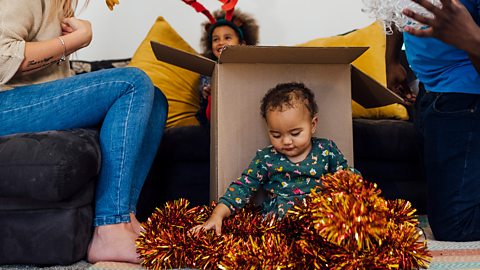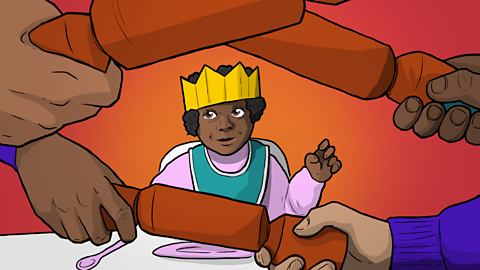With bright lights, crowds, unfamiliar noises, routine changes, and over-excited family members, Christmas can be an overwhelming experience for children and adults with sensory sensitivities. But there are ways you can steer through the disruption and keep the Christmas magic alive.
We’ve got a Santa’s sleighful of useful tips from both parents and experts to help you manage the overload.


Christmas can still be special but keep it as relaxed as possible
Corinne and her partner Luke have three sons, Caleb (6), Roman (4) and Hugo (3). Caleb and Roman both have autism. Corinne is also waiting for an autism assessment herself.
‚ÄúThere are so many expectations and pressures at Christmas. My advice is do it on your terms and try not to worry if things don‚Äôt go the way you hoped.‚ÄĚ
Keep things familiar and relaxed
“To minimise surprises, we stick with our routines during Christmas, otherwise it can lead to meltdowns and everyone feeling dysregulated. So, we’ll have mealtimes at the same time and the boys still eat the foods they’re comfortable with.
‚ÄúWe limit other people coming to our house and make sure that if anyone does want to see us, it‚Äôs only when the boys feel comfortable.‚ÄĚ
Gradually introduce festivities
‚ÄúOur boys are very aware of changes at home, so we‚Äôre careful about not springing anything on them. We keep them aware, step by step, of what‚Äôs going on. We gradually introduce decorations ‚Äď they help us put them up and we spread them out so none of the rooms are too crowded. And instead of one big and overwhelming reveal of presents, we stagger them, give the boys as much time as they need, and make sure gifts are unboxed and ready to go with batteries if needed. This way, we avoid frustration and anxieties around getting things out.‚ÄĚ


Adapt traditions to stay in your comfort zone
‚ÄúFind ways to make Christmas special that work for you and your family. Not all children with autism like lights, but mine do, so we have sensory festive lights up in the house. We also give the boys a Christmas Eve box containing small gifts like pyjamas and books. It introduces what's going to happen the next day in a slow, easy way.‚ÄĚ
Find SEN-friendly festive events
‚ÄúWe try to avoid busy and hectic places ‚Äď if you do need to get out, my advice is to go for early mornings and evenings. Look for Christmas events like Santa meet and greets that offer special educational needs sessions, this way your children get a real festive experience but in a quieter and less rushed way.‚ÄĚ
Relax when your plans change
“When the boys were younger, I spent so much time imagining the perfect Christmas Day. But I’ve learned that it’s best not to heap too many expectations on yourself. Accept that things won’t go a certain way and embrace it.
‚ÄúIf your child is happy to see Santa and get all the pictures, then that‚Äôs great. But if they are struggling and you have to leave early, that's totally fine too. Go easy on yourself.‚ÄĚ


Make your own festive traditions
Andi and his husband Darren have two adopted children ‚Äď a 3-year-old son and a 5-year-old daughter, who has been diagnosed with autism, sensory processing disorder, fetal alcohol syndrome and other invisible disabilities.
‚ÄúIt may be a joyful time of the year, but your child‚Äôs sensory issues don‚Äôt suddenly disappear at Christmas. If anything, they‚Äôre heightened. As much as we‚Äôd love a big, busy family Christmas, we are led by what our daughter is comfortable with.‚ÄĚ
Keep things as ‚Äėnormal‚Äô as possible
‚ÄúChristmas is usually the four of us doing regular Christmas things, but they‚Äôre dialled down. If we see family members, then it's usually for an hour or so. We have presents in the morning but without a fanfare ‚Äď and sometimes we space them out over the day and maybe Boxing Day too. When it comes to lunch, our children love a roast dinner but we don't go to town ‚Äď just a few Christmassy touches.‚ÄĚ
Flex around different needs in your family
“It’s really important to us that our daughter is included in everything we do. But it has to be meaningful for her. If we know she's not going to enjoy an activity, then one of us will stay home with her, while the other takes our son.
‚ÄúWe don‚Äôt view this as excluding her from things ‚Äď it's actually much kinder for her to be at home and feel safe with one of her dads. At home, she can do an alternative activity that is fulfilling.‚ÄĚ
Do your research about festive events
“Find out if there are SEN sessions for festive films, Santa meets, or pantomimes, which are set up to reduce anxieties. We tend to go to Santa’s grotto at a garden centre because it’s a tranquil place.
‚ÄúWe‚Äôre going to a panto this year but rather than a SEN session, we‚Äôre taking another adult to help manage our daughter‚Äôs needs. I‚Äôve booked seats next to the aisle and I‚Äôm planning to speak to theatre staff beforehand to explain that our daughter may have to leave and come back in. If you have a child with additional needs, I‚Äôd encourage you to have these chats ‚Äď in most cases, people are happy to help.‚ÄĚ

Use calming techniques that work for you
‚ÄúLean on any tips and tricks to diffuse anxiety ‚Äď it takes trial an error to find what works for you and your family. For example, if we need to go somewhere potentially hectic, we‚Äôll work out when the quietest time is and take a buggy for our daughter. We‚Äôve learned that sitting down reduces sensory input and grounds her, and she can cuddle her comforter or blanket if she wants.‚ÄĚ
Go for minimal, indestructible decorations
‚ÄúOur daughter can sometimes be quite impulsive and throw objects. So, we go minimalist with any decorations, apart from a few things placed high up. And we make sure anything that‚Äôs within reach is indestructible ‚Äď soft toys and cushions are perfect because it doesn't matter if your child wants to move, cuddle, or throw them.‚ÄĚ
Communicate with loved ones
“Be open and honest, explain that they need to be flexible about Christmas plans. Don’t worry about letting anyone down, they’ll understand. Ultimately, your child’s needs are the priority.
‚ÄúIf we‚Äôre invited to someone‚Äôs house, we find out how many people there‚Äôll be and what kind of event it is. This way, we can make an informed decision about going. It is always with the caveat about seeing how our daughter is on the day and that one of her dads might stay home with her, while the other attends with our son. If people come round to us, we ask that it‚Äôs in smaller groups and that they‚Äôre mindful of their excitement levels.‚ÄĚ


How to have an autism-friendly Christmas
‚ÄúThe main thing is not to feel pressured into doing things just because everyone else is doing them,‚ÄĚ says Tom Purser, Head of Guidance, Volunteering and Campaigns at the National Autistic Society.
‚ÄúIt‚Äôs absolutely key for parents and carers to think about ways to enjoy the festive season that work for them and their families. Good planning and small adjustments can make all the difference. Every autistic person is different, so it‚Äôs really important that there‚Äôs no pressure to do Christmas the ‚Äėright‚Äô way.‚ÄĚ
- Get support to take the pressure off. Wherever possible, involve your family, friends and any support services in your festive plans.
- Clear communication is key. When you talk to loved ones about how you will be celebrating, remember there may be certain things they may not fully understand‚Ķ This includes the complex issue of presents ‚Äď the number of them, the wrapping and unwrapping, and the expectations around how to respond.
- Use visual aids such as calendars, lists and schedules to help plan your Christmas. Try and plan for the whole break; that way, you can give yourself a couple of quiet days to recoup if needed.
- Think ahead about any sensory sensitivities that could cause you or your loved ones distress or discomfort and what can bring relief. For example, you may want to consider ear defenders, or turning off the Christmas lights at times of overload.
- Make sure there’s a quiet space to relax if someone’s feeling overwhelmed and stressed. This could be a completely Christmas-free area.
- Check with local venues about their Christmas events. Even if they don’t have specific autism-friendly times, you can ask the best time to visit when it’s quieter or less busy.






